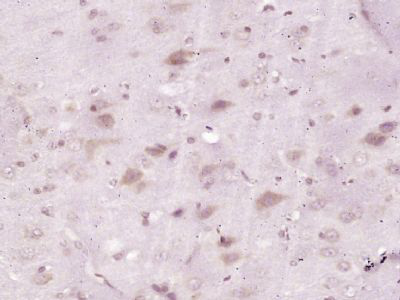产品货号 : mlR23484
英文名称 : FGF1
中文名称 : 酸性成纤维细胞生长因子抗体
别 名 : Acidic fibroblast growth factor; Acidic-fibroblast growth factor; aFGF; Beta endothelial cell growth factor; Beta-endothelial cell growth factor; ECGF; ECGF beta; ECGF-beta; ECGFA; ECGFB; Endothelial Cell Growth Factor alpha; Endothelial Cell Growth Factor beta; FGF 1; FGF alpha; FGF-alpha; FGF1_HUMAN; FGFA; Fibroblast Growth Factor 1 Acidic; Fibroblast growth factor 1; GLIO703; HBGF 1; HBGF-1; HBGF1; Heparin binding growth factor 1; Heparin binding growth factor 1 precursor; Heparin-binding growth factor 1 Fibroblast Growth Factor-acidic; Fibroblast Growth Factor acidic.
研究领域 : 肿瘤 细胞生物 免疫学 生长因子和激素
抗体来源 : Rabbit
克隆类型 : Polyclonal
交叉反应 : Human, Mouse, Rat, Pig, Horse, Rabbit,
产品应用 : ELISA=1:500-1000 IHC-P=1:400-800 IHC-F=1:400-800 ICC=1:100-500 IF=1:100-500 (石蜡切片需做抗原修复)
not yet tested in other applications.
optimal dilutions/concentrations should be determined by the end user.
分 子 量 : 16kDa
细胞定位 : 细胞核 细胞浆 细胞膜 分泌型蛋白
性 状 : Lyophilized or Liquid
浓 度 : 1mg/ml
免 疫 原 : KLH conjugated synthetic peptide derived from human FGF1:81-135/155
亚 型 : IgG
纯化方法 : affinity purified by Protein A
储 存 液 : 0.01M TBS(pH7.4) with 1% BSA, 0.03% Proclin300 and 50% Glycerol.
保存条件 : Store at -20 °C for one year. Avoid repeated freeze/thaw cycles. The lyophilized antibody is stable at room temperature for at least one month and for greater than a year when kept at -20°C. When reconstituted in sterile pH 7.4 0.01M PBS or diluent of antibody the antibody is stable for at least two weeks at 2-4 °C.
PubMed : PubMed
产品介绍 : FGF1 also designated Heparin-binding growth factor 1 precursor (HBGF-1) ; Acidic fibroblast growth factor (aFGF). heparin-binding growth factors are angiogenic agents in vivo and are potent mitogens for a variety of cell types in vitro. There are differences in the tissue distribution and concentration of these 2 growth factors. Subunit si monomer.FGF1 belongs to the heparin-binding growth factors family. may play a role in neurite outgrowth; may regulate cell differentiation in the nervous system; may act in synergy with fibronectin to enhance neuronal cell adhesion.
Function:
The heparin-binding fibroblast growth factors play important roles in the regulation of cell survival, cell division, angiogenesis, cell differentiation and cell migration. They are potent mitogens in vitro.
Subunit:
Monomer. Homodimer. Interacts with FGFR1, FGFR2, FGFR3 and FGFR4. Affinity between fibroblast growth factors (FGFs) and their receptors is increased by heparan sulfate glycosaminoglycans that function as coreceptors. Found in a complex with FGFBP1, FGF1 and FGF2. Interacts with FGFBP1. Part of a Cu(2+)-dependent multiprotein aggregate containing FGF1, S100A13 and SYT1. Interacts with SYT1. Interacts with S100A13. Interacts with LRRC59. Interacts with CSNKA, CSNKB and FIBP. While binding with LRRC59, CSNKA and FIBP seem mutually exclusive, CSNKB and FIBP may cooperatively interact with FGF1.
Subcellular Location:
Secreted. Cytoplasm. Cytoplasm, cell cortex. Cytoplasm, cytosol. Nucleus. Note=Lacks a cleavable signal sequence. Within the cytoplasm, it is transported to the cell membrane and then secreted by a non-classical pathway that requires Cu(2+) ions and S100A13. Secreted in a complex with SYT1 (By similarity). Binding of exogenous FGF1 to FGFR facilitates endocytosis followed by translocation of FGF1 across endosomal membrane into the cytosol. Nuclear import from the cytosol requires the classical nuclear import machinery, involving proteins KPNA1 and KPNB1, as well as LRRC59.
Tissue Specificity:
Predominantly expressed in kidney and brain. Detected at much lower levels in heart and skeletal muscle.
Post-translational modifications:
In the nucleus, phosphorylated by PKC/PRKCD.
Similarity:
Belongs to the heparin-binding growth factors family.
SWISS:
P61148
Gene ID:
2246
Important Note:
This product as supplied is intended for research use only, not for use in human, therapeutic or diagnostic applications.
生长因子和激素( Growth Factor and Hormones)
肝素结合生长因子(FGF1)可与肝素结合是血管生成剂,还是多种细胞强的促细胞分裂剂,可刺激多种中胚层细胞的生长包括软骨细胞、粒细胞和内皮细胞,在创伤愈合及动物肢体再生中可能起作用。在不同的组织中分布和含量不同,以单体形式存在,属于肝素结合生长因子家族成员之一。
产品图片












